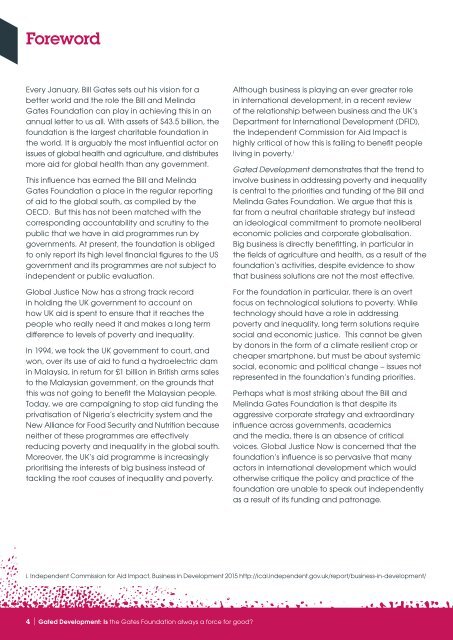Gated Development
gated_development_final_version
gated_development_final_version
Create successful ePaper yourself
Turn your PDF publications into a flip-book with our unique Google optimized e-Paper software.
Foreword<br />
Every January, Bill Gates sets out his vision for a<br />
better world and the role the Bill and Melinda<br />
Gates Foundation can play in achieving this in an<br />
annual letter to us all. With assets of $43.5 billion, the<br />
foundation is the largest charitable foundation in<br />
the world. It is arguably the most influential actor on<br />
issues of global health and agriculture, and distributes<br />
more aid for global health than any government.<br />
This influence has earned the Bill and Melinda<br />
Gates Foundation a place in the regular reporting<br />
of aid to the global south, as compiled by the<br />
OECD. But this has not been matched with the<br />
corresponding accountability and scrutiny to the<br />
public that we have in aid programmes run by<br />
governments. At present, the foundation is obliged<br />
to only report its high level financial figures to the US<br />
government and its programmes are not subject to<br />
independent or public evaluation.<br />
Global Justice Now has a strong track record<br />
in holding the UK government to account on<br />
how UK aid is spent to ensure that it reaches the<br />
people who really need it and makes a long term<br />
difference to levels of poverty and inequality.<br />
In 1994, we took the UK government to court, and<br />
won, over its use of aid to fund a hydroelectric dam<br />
in Malaysia, in return for £1 billion in British arms sales<br />
to the Malaysian government, on the grounds that<br />
this was not going to benefit the Malaysian people.<br />
Today, we are campaigning to stop aid funding the<br />
privatisation of Nigeria’s electricity system and the<br />
New Alliance for Food Security and Nutrition because<br />
neither of these programmes are effectively<br />
reducing poverty and inequality in the global south.<br />
Moreover, the UK’s aid programme is increasingly<br />
prioritising the interests of big business instead of<br />
tackling the root causes of inequality and poverty.<br />
Although business is playing an ever greater role<br />
in international development, in a recent review<br />
of the relationship between business and the UK’s<br />
Department for International <strong>Development</strong> (DFID),<br />
the Independent Commission for Aid Impact is<br />
highly critical of how this is failing to benefit people<br />
living in poverty. i<br />
<strong>Gated</strong> <strong>Development</strong> demonstrates that the trend to<br />
involve business in addressing poverty and inequality<br />
is central to the priorities and funding of the Bill and<br />
Melinda Gates Foundation. We argue that this is<br />
far from a neutral charitable strategy but instead<br />
an ideological commitment to promote neoliberal<br />
economic policies and corporate globalisation.<br />
Big business is directly benefitting, in particular in<br />
the fields of agriculture and health, as a result of the<br />
foundation’s activities, despite evidence to show<br />
that business solutions are not the most effective.<br />
For the foundation in particular, there is an overt<br />
focus on technological solutions to poverty. While<br />
technology should have a role in addressing<br />
poverty and inequality, long term solutions require<br />
social and economic justice. This cannot be given<br />
by donors in the form of a climate resilient crop or<br />
cheaper smartphone, but must be about systemic<br />
social, economic and political change – issues not<br />
represented in the foundation’s funding priorities.<br />
Perhaps what is most striking about the Bill and<br />
Melinda Gates Foundation is that despite its<br />
aggressive corporate strategy and extraordinary<br />
influence across governments, academics<br />
and the media, there is an absence of critical<br />
voices. Global Justice Now is concerned that the<br />
foundation’s influence is so pervasive that many<br />
actors in international development which would<br />
otherwise critique the policy and practice of the<br />
foundation are unable to speak out independently<br />
as a result of its funding and patronage.<br />
i. Independent Commission for Aid Impact, Business in <strong>Development</strong> 2015 http://icai.independent.gov.uk/report/business-in-development/<br />
4 I <strong>Gated</strong> <strong>Development</strong>: Is the Gates Foundation always a force for good?


